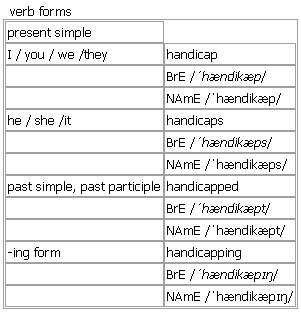|
Từ điển Oxford Advanced Learner 8th
 handicap
handicap

handi·cap [handicap handicaps handicapped handicapping] noun, verb BrE [ˈhændikæp] NAmE [ˈhændikæp]
noun
1. countable, uncountable (becoming old-fashioned, sometimes offensive)a permanent physical or mental condition that makes it difficult or impossible to use a particular part of your body or mind
Syn: ↑disability
•Despite her handicap, Jane is able to hold down a full-time job.
•mental/physical/visual handicap
2. countable something that makes it difficult for sb to do sth
Syn: ↑obstacle
•Not speaking the language proved to be a bigger handicap than I'd imagined.
•In a job like this, lack of experience is no real handicap.
3. countable (sport)a race or competition in which the most skilful must run further, carry extra weight, etc. in order to give all those taking part an equal chance of winning; the disadvantage that is given to sb you are competing against in such a race or competition
4. countable (in ↑golf)an advantage given to a weaker player so that competition is more equal when they play against a stronger player. It is expressed as a number related to the number of times a player hits the ball and gets lower as he/she improves
•He plays off a handicap of 5.
Word Origin:
mid 17th cent.: from the phrase hand in cap; originally a pastime in which one person claimed an article belonging to another and offered something in exchange, any difference in value being decided by an umpire. All three deposited forfeit money in a cap; the two opponents showed their agreement or disagreement with the valuation by bringing out their hands either full or empty. If both were the same, the umpire took the forfeit money; if not it went to the person who accepted the valuation. The term handicap race was applied (late 18th cent.) to a horse race in which an umpire decided the weight to be carried by each horse, the owners showing acceptance or dissent in a similar way: hence in the late 19th cent. handicap came to mean the extra weight given to the superior horse.
Which Word?:
disabled / handicapped
Disabled is the most generally accepted term to refer to people with a permanent illness or injury that makes it difficult for them to use part of their body completely or easily. Handicapped is slightly old-fashioned and many people now think it is offensive. People also now prefer to use the word disability rather than handicap. The expression disabled people is often preferred to the disabled because it sounds more personal.
Disabled and disability can be used with other words to talk about a mental condition: ▪ mentally disabled ◇ ▪ learning disabilities.
If somebody’s ability to hear, speak or see has been damaged but not destroyed completely, they have impaired hearing/speech/sight (or vision). They can be described as visually/hearing impaired or partially sighted: ▪ The museum has special facilities for blind and partially sighted visitors.
Example Bank:
•His lack of height can prove a handicap against tall players.
•If you don't speak the language, you'll have a real handicap.
•Lack of books was a major handicap.
•Over a million people in Great Britain suffer from mental handicap.
•She can't drive because of her visual handicap.
•She has managed to overcome her physical handicaps.
•This could be a serious handicap to her education.
•Handicap can place a great deal of pressure on relatives.
•Not speaking the language proved to be a bigger handicap than I'd imagined.
•The knee injury turned out to be a considerable handicap to Paul.
verb (-pp-)usually passive ~ sb/sth
to make sth more difficult for sb to do
•British exports have been handicapped by the strong pound.
Verb forms: 
Word Origin:
mid 17th cent.: from the phrase hand in cap; originally a pastime in which one person claimed an article belonging to another and offered something in exchange, any difference in value being decided by an umpire. All three deposited forfeit money in a cap; the two opponents showed their agreement or disagreement with the valuation by bringing out their hands either full or empty. If both were the same, the umpire took the forfeit money; if not it went to the person who accepted the valuation. The term handicap race was applied (late 18th cent.) to a horse race in which an umpire decided the weight to be carried by each horse, the owners showing acceptance or dissent in a similar way: hence in the late 19th cent. handicap came to mean the extra weight given to the superior horse.
Example Bank:
•Smaller parties are seriously handicapped by the electoral system.
•The team was handicapped by the loss of their key striker early in the game.
|
|
|
▼ Từ liên quan / Related words
|
|
